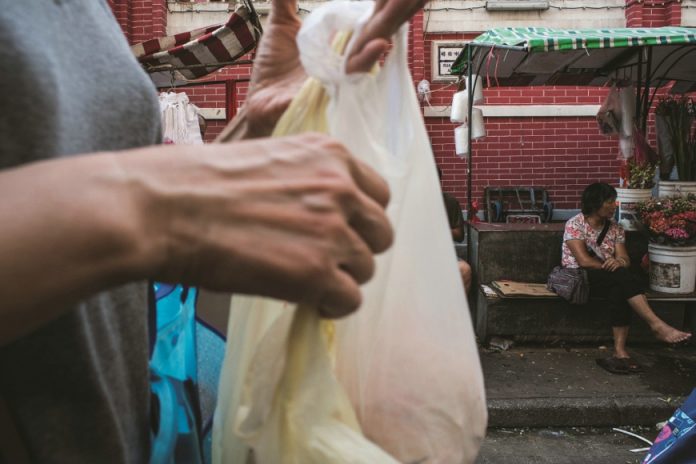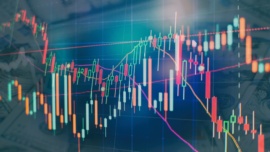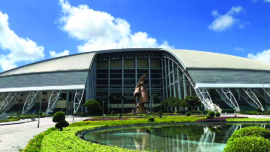The bill to restrict the usage of plastic bags this month should just mark the beginning of a series of measures by the government to rein in the plastic usage here, say observers.
Starting from this month, Uncle Bio’s small eatery located in the district of Rua da Barca could have at least MOP4,500 (US$562.5) more every month in revenue. But he seems stressed out — at least for now — about the prospect.
“First, I’m worried there will be quarrels with customers,” he noted. “Second, if my staff forgets and gives out a bag freely to customers, I will be fined MOP1,000; that’s daunting.”
Uncle Bio is speaking about the anti-plastic bag bill, which aims to minimise the negative impact of plastic on the environment, that will come into force on November 18. While all walks of life agree with the government’s initiative — urging that there should be more promotion about this new bill — some also say there should be more restrictions on the usage of plastic in the gambling enclave.
After getting a green light from the Legislative Assembly in August on the restriction of the distribution of plastic bags, Law No. 16/2019 bans the free distribution of plastic bags in all retail segments, as well as food and beverage and service industries, including supermarkets, grocery and convenience stores, pharmacies, apparel and jewellery stores, restaurants, eateries, bakeries and so forth.
The law stipulates that each plastic bag given out by merchants to customers — including general plastic bags, paper bags and eco-friendly bags with plastic components — should be charged MOP1. Merchants that provide plastic bags freely to customers will be penalised MOP1,000 for each plastic bag they have given out, in addition to a fine of MOP10,000.
There has not been any recent data concerning Macau residents’ disposal of plastic bags, but according to a study done by the Environmental Protection Bureau back in 2013, the city consumed 450 million plastic bags a year, or 2.2 plastic bags disposed by each resident a day. The bureau expects the usage of plastic bags to be reduced by at least half in the beginning stage of the enforcement of the new law.

Awareness
Samantha Chan, an owner at a boutique clothing store in the city’s downtown, supports the initiative. “Some of our customers have brought their own bags during purchase,” she said. “Also, I don’t think they would mind paying MOP1 more for purchases worth several hundred-1,000 patacas or more.”
As some of her customers are travellers, she thinks the government could do more promotions to enhance the travellers’ awareness of this new law. “I don’t think they [travellers] will mind paying MOP1 more for the bag, but if they know about this when arriving to the city, it will save us time to explain this new measure to them.”
According to the Environmental Protection Bureau, it has carried out numerous seminars about this new law since end-August, targeting the representatives of government departments, associations, supermarket and retail chains, pharmacies, food and beverage outlets, souvenir stores, gaming and hotel operators.
The bureau added that its staff has also visited different areas, from the northern district to Taipa, to advocate the law, stressing the key of the law is not about imposing charges or penalties for using plastic bags, but “creating a plastic reduction atmosphere in the community.”
The Macau Federation of Trade Unions, the city’s largest labour group, is one of the prominent grassroots associations here that has collaborated with the authorities to promote this anti-plastic law in recent times.
Exception
“Most residents and merchants are aware of this plastic bag bill but they are not very clear yet about the exception cases,” Ella Lei Cheng I, vice president of the association, said.

The plastic bags provided for goods purchased in retail outlets in the restricted area of the airport, or bags for non-prepacked food and medicine, are exempted from the MOP1 charge, the new law says. There are also various exemption scenarios in different sectors. For instance, if a customer could not finish a dine-in order in an eatery, they could ask for a free-of-charge bag to take the food or drinks home; the eatery, however, has to charge the customer for a bag for takeaway.
“There should be more promotion in these areas so that both merchants and residents can get used to the details as soon as possible,” said Ms. Lei, who is also a legislator.
“But this bill only regulates the usage of plastic bags it does not cover other plastic products like plastic bottles, straws, single-use plastic utensils,” she said. “The government should actively implement more measures to reduce the adverse impact of plastic upon the environment, for example, urging large corporations like gaming operators to further restrict the plastic usage before extending to the wider community.”

Rebound later
Macau is the last jurisdiction in the Greater China region to introduce the anti-plastic bag bill. Taiwan first banned free plastic bags in the retail sector in 2002, followed by Mainland China in 2008 and Hong Kong, where free plastic bags were forbidden in selected outlets in 2009 before a citywide ban in 2015. But the Macau administration only proposed a similar draft bill in 2016, with a public consultation exercise, before it comes into force this month.
“Compared with nearby regions, the city’s anti-plastic efforts have started pretty late. This plastic bag bill should just be the beginning of more measures to come online in the future,” said Lei Leong Wong, president of the Macau United Citizens Association, another prominent grassroots group in the city.
He expects the bill could dampen the usage of plastic bags in the beginning stage, as the experiences of other places show, before picking up again later.
According to figures from the Hong Kong Environmental Protection Department, the number of plastic bags disposed in the Asian financial centre dropped 5 percent in 2010, after the bill against free plastic bags was introduced in selected retail outlets a year before, and the figure hit the lowest point in 2015 when the ban was expanded to the entire city. But the figure increased for two consecutive years after 2015: the number of plastic bags disposed in 2017 reached 4.2 billion, increasing 12.4 percent from two years ago.
To curb the usage of plastic, Mr. Lei believes the key is to enhance the public awareness of environmental protection, in particular among youngsters. “In the regions with advanced experiences in environmental protection, the authorities focus on enhancing the public awareness of environmental protection from school level,” he added.

More education
According to latest annual report on the state of the environment of Macau, every resident produced in average 2.17 kilogrammes of solid waste a day in 2018, jumping 0.5 percent from the previous year and 3.3 percent from two years earlier. And the plastic waste amounted to 22.5 percent of the per capita solid waste disposal in 2018.
The daily per capita solid waste disposal in Macau was much higher than many places, namely 1.45 kilogrammes in Hong Kong and Singapore, 1.17 kilogrammes in Beijing and 0.99 kilogrammes in Guangzhou, the report added.
Ho Wai Tim, chairperson of the Macau Ecological Society, pinpointed, “It’s difficult to reduce the use of plastic by just charging MOP 1 per bag; the government should have a bag of tricks to achieve this goal.”
The authorities should consider the possibilities of limiting the quantity of plastic bags the city imports each year, which would be a more effective tool than the plastic bag charge, as well as mandating the plastic bags used in the city should be compost plastic bags, he suggested.
“I’ve seen the Environmental Protection Bureau has done a lot of work in the promotion [about this bill] but it hasn’t done much concerning education, which is the key,” said Mr. Ho, sharing a similar perspective as Mr. Lei.
Back to the local eatery, Uncle Bio stressed that he supported this initiative of restricting plastic bags. “Some of our customers are very nice, bringing their own bags and utensils to buy takeaway,” he said. “But some are greedy — they ask for several bags and sets of utensils for just one or two things — and they should have been charged more.”
























